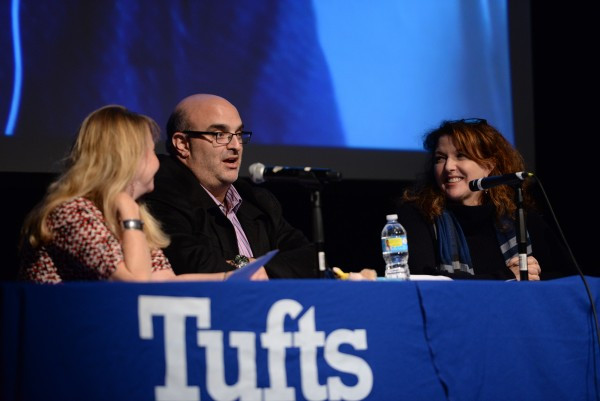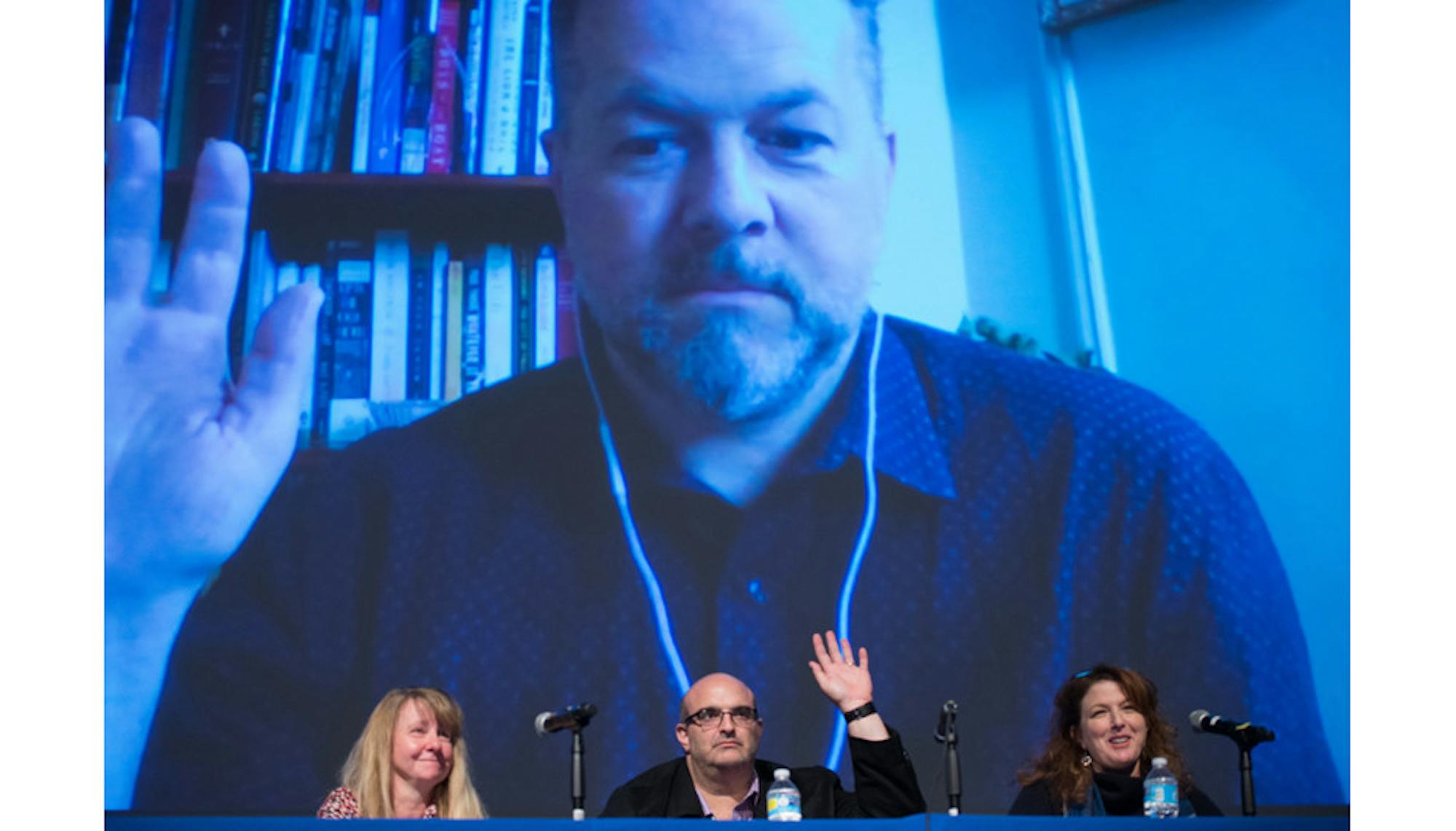The Film and Media Studies (FMS) program and the Career Center hosted the annual “On the Air: Media Careers for the Networked Generation” event, where Tufts alumni spoke about their careers in the media industry, last Friday afternoon. The event featured a keynote panel, two panel sessions and an opportunity for students and alumni to mingle and network.
Approximately 50 people gathered for the keynote panel discussion between alumni involved in the production of AMC’s "Breaking Bad" (2008-2013). FMS Co-Director Julie Dobrow opened the keynote with a short clip featuring actor David Costabile (LA '89) as Breaking Bad character Gale Boetticher. Dobrow introduced the three panel members: Sharon Hall(J '86), president of Endemic Shine Studios, Alexander Marin (LA '92), executive vice president of international distribution for Sony Pictures Television, and Costabile, who Skyped into the discussion from his home in Brooklyn.
Hall, who participated in the development of Breaking Bad, explained that she was an early advocate for the television show, which was originally difficult to sell to networks. She said that she helped orchestrate its move from FX to rival network AMC, which did not sit well with FX executives. Hall said that in regards to the show's tenuous and unauthorized sale, the mentality was, “Let's not ask for permission, let's beg for forgiveness.”
At AMC, the show underwent a series of budget cuts that reorganized plot points and forced the series setting to relocate from Pasadena, California to the more tax-friendly Albuquerque, New Mexico, Hall explained.
Though critically-acclaimed from the beginning, Hall said that Breaking Bad’s viewership struggles prompted AMC to cancel it after the first season. She said she and others fought back, telling AMC leadership, “Not only are you not going to cancel the show, you are going to renew it until it reaches its natural conclusion.” The show ultimately continued for another four seasons.
Marin, who spearheaded the development of Breaking Bad’s Spanish-language remake, Metástasis, also spoke about the show’s early struggles. He explained that Breaking Bad caught on after it became available on-demand through Netflix.
“The ability to watch a very close-ended show [like Breaking Bad] straight through was great for the audience,” he said.
According to both Hall and Marin, Breaking Bad's success on Netflix gave it a following and saved it from the chopping block.
Dobrow explained that such experiences with new forms of media consumption drove her to organize the panel.
“As somebody who studies media, I know that Breaking Bad was not only an incredible TV show, but one that redefined how TV is distributed,” she said.
After the keynote panel, students attended breakout sessions featuring alumni involved in four sectors of the media industry: news, television, film and marketing.
At the news breakout session "The Spin Zone: Making and Shaping the News," Neal Shapiro(LA '80),president and CEO of public television network WNET, spoke to students about the challenges of the journalism industry.
“If you like something that’s exciting and unpredictable, these jobs are for you,” he said.
The session gave students an opportunity to ask questions, with some expressing concern about entering a competitive media job market and Tufts’s lack of a journalism tract which students fear put them at a disadvantage.
Rosanna Xia (LA '11), a staff reporter for the Los Angeles Times, explained at the news panel that although there is no journalism major at Tufts, the university's liberal arts education and specialized fields of study could be beneficial for aspiring journalists. Xia graduated from Tufts with a double major in Quantitative Economics and International Relations and a minor in Communications and Media Studies, according to the panel's Eventbrite page.
Other panels included "Trending in Digital: Advertising and Marketing in the 21st Century," "Nothing sells like success: How to develop a series for television" and "From Pitch to Production: Movies and Features," according to the Eventbrite page.
Nancy Glass (J '77), the owner of Philadelphia-based production company Nancy Glass Productions, was also in attendance at "On the Air." As the Vice-Chair of the University’s Board of Advisors, she initiated the inaugural "On the Air" event three years ago.
“I saw that [the Career Center] did a crash course in finance,” she said. “Why not do the same [for media]?”
Senior Kels Hoffman said the event allowed students to hear how alumni found success in the media industry.
“I just wanted to hear people passionate about what they were doing,” Hoffman said.
At the event, alumni explained that there is no surefire way to be successful in the media industry, and that finding hands-on experience through internships is potentially more important than a college education.
“When you show up in college you think you know everything,” Marin said. “By the time you leave, you know that you don't know anything.”
Alumni speak about media industry, careers at annual 'On the Air' event

–Members of the keynote panel of the annual "On the Air: Media Careers for the Networked Generation" event on March 4 raise their hand in response to a question asking who has watched "Breaking Bad," a show that the panelists were all involved in. Above, actor David Costabile (A89) skypes into the panel.





